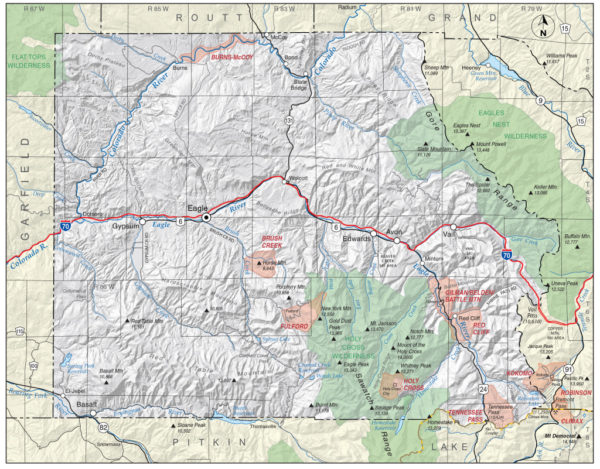Colorado county divided in Congress, largely united behind public lands

Eagle County Colorado is split over two congressional districts with two representatives – Democrat Joe Neguse (CD2) and Republican Scott Tipton (CD3) — who have dramatically different ideas about how public lands should be managed.

That divide has never been more on display than it was Tuesday during a House Natural Resource Committee Hearing on the Colorado Outdoor Recreation and Economy (CORE Act) – a sweeping wilderness protection and special management bill that protects 400,000 acres of federal lands across Colorado, including areas of Eagle County such as Camp Hale.
Neguse, the newly elected congressman for CD2, which includes Boulder and Fort Collins on the Front Range but also reaches up into Summit County and part of the Vail Valley, introduced the CORE Act along with Democratic Sen. Michael Bennet in January. Republican Sen. Cory Gardner has not backed the bill, and neither has Tipton.
With Democrats regaining control of the house for the first time since 2010, the wilderness bill that includes four previous proposals finally got a hearing in a legislative body that under GOP control was long opposed to more restrictive designations prohibiting motorized travel and resource extraction such as mining and oil and gas drilling on U.S. Forest Service and BLM land.
“I’m proud that the CORE Act was crafted by Coloradans over a decade of collaboration,”Negusesaid Tuesday. “This bill comes with input from our local elected officials, outdoor recreation businesses, conservation groups, ranchers and sportsman.
“Public lands are who we are as Coloradans; they are rooted at the foundation of our state’s economy; they inspire our commitment to sustainability and define our state’s character; and I’m grateful to be able to work with community members from across our great state on this bill to preserve and invest in Colorado’s precious public lands.”
Tipton, who was swept into Congress in 2010 during the anti-Obama Tea Party wave, has long favored more diverse uses of federal public lands that encompass much of his sprawling district, which divides Eagle County but also includes most of the Western Slope all the way to the Utah border. He has a history of supporting mineral extraction proposals on federal lands.

Although Tipton ultimately backed the Hermosa Creek wilderness proposal – the last major Colorado wilderness bill that passed in 2014 – he was embroiled in controversy in 2016 over his backing of an oil and gas bill in the Thompson Divide area near Carbondale that was allegedly authored by a Houston oil company owning leases in the area and donating heavily to Tipton.
So on Tuesday, Tipton testified and questioned witnesses at the CORE Act hearing, and he entered into the record an article by the Glenwood Post Independent about the Garfield County commissioners opposing the CORE Act’s permanent removal of the Thompson Divide from consideration for mineral leasing. Those commissioners also have a long history of backing oil and gas operations in the second most drilled county in the state – behind only Weld County.
Eagle County supports the CORE Act, and commissioner Kathy Chandler-Henry has met with members of Colorado’s congressional delegation, including Gardner, to express that support.
Tipton kicked off his testimony by asking if he could ask Neguse some questions about the bill but was told to talk to his fellow Colorado congressman outside of the hearing process and to focus on the actual witnesses testifying on the bill. Tipton on Tuesday did acknowledge he’s heard from many supporters of the CORE Act.
“We’ve heard that there is and I’ve spoken to a lot of folks that are supportive of the concepts that are in the CORE Act, but I think that it is important to note that we do still have differing opinions that are in my district that may not have had their voices heard in development of some of this legislation,” Tipton told the committee.
He then went on to offer up letters of opposition from the Colorado Wool Growers Association, the Colorado Off-Highway Vehicle Coalition, the Colorado Snowmobile Association, the Trail Preservation Alliance and the timber industry-backed Intermountain Forest Association.
Former Summit County Commissioner Dan Gibbs, now head of the Colorado Department of Natural Resources, testified in favor of the CORE Act on Tuesday.
“The legislation strikes the right balance by protecting key public lands from development while preserving existing uses,” Gibbs said. “In Colorado, we have a long and rich tradition of public lands protection, and I urge the committee to quickly move the CORE Act forward.”
Here’s a story on the CORE Act produced for the Vail Daily by RealVail.com on published on March 21:
Facing a full-court press from local elected officials and conservation groups to back the CORE Act and protect large swaths of Colorado wilderness, U.S. Sen. Cory Gardner contends the legislation – despite a decade of negotiation – is not yet ready for primetime.
Gardner has been taking some heat for not sponsoring any major wilderness legislation since taking office in 2014 and for failing to include some form of wilderness protection in the Natural Resources Management Act, now known as the John D. Dingell, Jr. Conservation, Management, and Recreation Act after President Donald Trump signed it into law on March 12.

The CORE Act, or the Colorado Outdoor Recreation and Economy Act, was introduced by Sen. Michael Bennet and U.S. Rep. Joe Neguse – the congressman whose district includes Vail – on Jan. 25. It combines four previous bills, including the Continental Divide Recreation, Wilderness and Camp Hale Legacy Act, protecting 400,000 total acres and 73,000 acres as new wilderness.
“The Department of Defense has issues with the Camp Hale piece of the bill,” Gardner spokesman Jerrod Dobkin told the Vail Daily on Tuesday. “Sen. Gardner has never blocked the bill from moving forward and Sen. Gardner does not determine what bills come before the Energy and Natural Resources Committee for a hearing.”
Proponents of the CORE Act contend that any issues with creating the first-of-its-kind National Historic Landscape designation for Camp Hale, forever protecting the home of the famed 10th Mountain Division, can be worked out with the Department of Defense in a hearing before the Senate Energy and Natural Resources Committee, which Gardner serves on.
Eagle County Commissioner Kathy Chandler-Henry met with Gardner and his staff in Washington while attending a National Association of Counties meeting earlier this month. She was joined by San Miguel County Commissioner Hilary Cooper and Gunnison County Commissioner Jonathan Houck.
“Gardner’s position currently is that he ‘won’t block’ [CORE Act] legislation but has some outstanding concerns,” Chandler-Henry said. “Grazing issues on the San Juan raised by the Farm Bureau, some pullback from Garfield County on support for Thompson Divide, and some questions from the Department of Defense on Camp Hale.
“We pointed out that the many stakeholder groups in all the affected counties support the bill,” she added. The commissioners later met with Bennet’s staff.
“They are actively working with the DOD to make sure the cleanup works well between the Forest Service and Army Corps of Engineers [at Camp Hale],” Chandler-Henry said. “As the bill works its way through committee and comments, any concerns can be worked out.”
While Gardner is the only Colorado senator who hasn’t sponsored any major wilderness legislation since the Wilderness Act first passed in 1964, including all of his Republican predecessors, he has been praised for his role in reauthorizing the Land and Water Conservation Fund and resolving key local public lands issues such as Bolts Lake near Minturn.
“We’re hopeful that Sen. Gardner changes his stance from neutral to supporter [on the CORE Act], as his support will be very helpful to getting the bill heard in committee,” Chandler-Henry said.
While special recreational designations have been included in the CORE Act, protecting mechanized travel such as mountain biking in certain areas, some motorized recreation groups have been grumbling about the legislation lately. Letters to the editor in the Vail Daily and other papers claimed major motorized use restrictions but were later corrected or removed.
One of the letters, still posted on the Durango Herald website, was debunked by another letter writer.
“The CORE Act enjoys the support of hundreds of community businesses, recreational user groups and local governments. It would have a negligible impact on motorized users, closing no roads or trails that are currently open,” said Scott Braden, wilderness and public lands advocate for Conservation Colorado.
“For a few motorized users to come out in opposition isn’t a surprise, but it is surprising to see them resort to false claims about the CORE Act to agitate their base and try to prevent Sen. Gardner from supporting it.”
Scott Jones serves as president of the Colorado Snowmobile Association, vice president of the Colorado Off-Highway Vehicle Coalition and is an authorized representative of the Trail Preservation Alliance.
Jones said he has not been included in CORE Act discussions or previous versions of the bill, such as the Continental Divide Recreation, Wilderness and Camp Hale Legacy Act, and wants to see motorized travel preserved in writing in the legislation.
“Camp Hale is open currently, and that’s one of the things throughout this piece of legislation we’re being told is that, ‘Oh well, you know, you get access to this,’ Jones said. “Well, we’ve already got access to it; that’s not a win for us. Why don’t we just clarify that in the legislation?”
Jones argues that over time, as the state’s population continues to boom, it may be necessary to expand trails for motorized use.
“That’s what we’re concerned about from a long-term perspective is if we’re locking up everything, where do people go? You can only put so many people on the trail and we’re way above the national average for that issue already and we may actually have to expand our trail networks someplace,” Jones added. “Let’s have a discussion.”
Bennet’s office contends many different outdoor recreation groups have been included in the negotiations over the CORE Act, including motorized users.
“The CORE Act has broad support, and we look forward to working with the relevant committees to move this bill forward in Congress,” a Bennet spokeswoman said.


Latest posts by David O. Williams (see all)
- During National Small Business Month, Target, DreamSpring put funding bullseye on underrepresented communities in Denver area - May 29, 2025
- Colorado senator urges Supreme Court to hold Trump administration in contempt on deportations - April 19, 2025
- Conductor who brought back Colorado ski train wants to use rail to save state’s highways for skiing - March 20, 2025

You must be logged in to post a comment Login